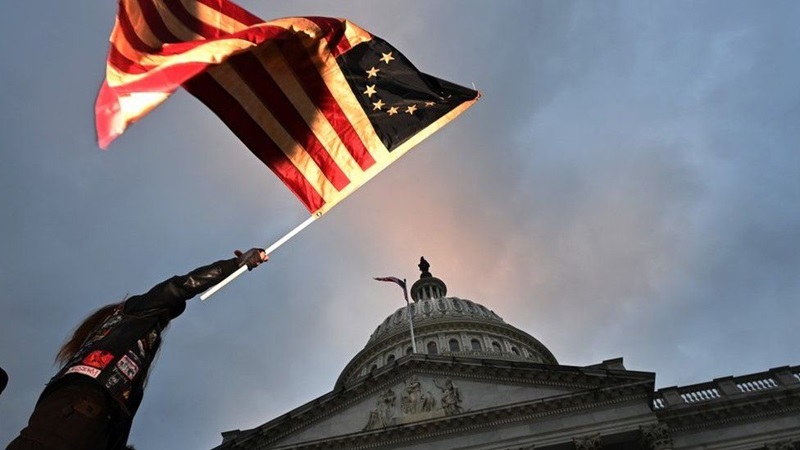Ray Epps, a key figure in the investigation into the Capitol riot on January 6th, has been sentenced to probation as a result of his involvement in the events leading up to the breach of the Capitol building. Epps’ actions and statements have been the subject of much speculation and controversy, with many believing that he played a significant role in inciting the violence that took place that day.
Despite this, Epps has maintained his innocence and has consistently denied any wrongdoing. The decision to sentence him to probation has sparked further debate about the extent of his involvement and whether or not he should have faced more severe consequences for his actions. Epps’ case serves as a reminder of the complexities and challenges of investigating and prosecuting individuals involved in acts of political violence.

Sentencing Overview
Sentencing is a crucial component of the criminal justice system, as it determines the consequences that individuals will face for their actions. It involves a judge considering various factors such as the severity of the crime, the defendant’s criminal history, and any mitigating or aggravating circumstances. Sentencing aims to achieve a balance between holding individuals accountable for their actions and promoting rehabilitation and deterrence. Judges have discretion in determining the appropriate sentence, which can range from fines and probation to incarceration.
Sentencing guidelines are often used to ensure consistency in sentencing across similar cases. In some cases, alternative sentencing options such as community service or drug rehabilitation programs may be considered. The ultimate goal of sentencing is to achieve justice and protect society by imposing consequences that are proportionate to the offense committed. Sentencing also plays a role in promoting public confidence in the justice system by demonstrating that individuals who break the law will be held accountable. Overall, sentencing is a complex and multifaceted process that requires careful consideration of various factors to ensure that justice is served.

The Conspiracy Theories
Conspiracy theories have long captivated the minds of individuals seeking to make sense of complex and mysterious events. These theories often center around secret plots or covert actions orchestrated by powerful entities, leading to widespread speculation and debate among believers and skeptics alike. While some conspiracy theories may seem outlandish or far-fetched, they can also serve as a means of challenging mainstream narratives and questioning the official explanations provided by authorities. In some cases, conspiracy theories have even been used as a form of social commentary or political critique, shedding light on real or perceived injustices and power imbalances within society.
However, the proliferation of conspiracy theories can also have negative consequences, fueling distrust, paranoia, and division among individuals and communities. It is important for individuals to critically evaluate the evidence and sources behind conspiracy theories, distinguishing between legitimate concerns and baseless speculation. Ultimately, the allure of conspiracy theories lies in their ability to offer alternative interpretations of reality and provoke critical thinking about the world around us.
Public Reaction and Media Coverage
Public reaction and media coverage play a significant role in shaping the public’s perception of various events and issues. When a controversial topic arises, the public often relies on the media to provide information and updates on the situation. The way the media covers a particular story can influence how the public feels and reacts to it. For example, if a story is sensationalized or exaggerated, it can lead to heightened emotions and reactions from the public. On the other hand, if a story is presented in a balanced and objective manner, it can help to inform the public and encourage thoughtful discussion and debate.
In some cases, the public’s reaction to a story can also influence how the media covers it. If a story receives a significant amount of attention and backlash from the public, the media may be more inclined to continue covering it in order to satisfy their audience. Overall, the relationship between public reaction and media coverage is complex and symbiotic. Both have the power to influence and shape each other, ultimately affecting how the public perceives and responds to various events and issues. It is important for both the media and the public to be mindful of their roles in this dynamic relationship and strive to promote responsible and informed discourse.

Legal and Political Implications
Legal and political implications refer to the consequences and impacts of decisions made by governing bodies and authorities on society and individuals. These implications can shape the way society functions, affecting everything from individual rights to the distribution of power within a society. When considering legal and political implications, it is important to understand the broader context in which decisions are made and how they can impact various aspects of society. For example, a political decision to allocate resources to a particular sector may have legal implications in terms of regulations and laws that govern that sector.
Additionally, decisions made by lawmakers can have far-reaching effects on the rights and freedoms of individuals, as well as on the overall stability and functioning of a society. It is crucial for policymakers and citizens alike to consider the legal and political implications of decisions in order to ensure that they are in the best interest of society as a whole. By understanding and addressing these implications, societies can work towards creating a more just and equitable system that respects the rights and freedoms of all individuals. Ultimately, legal and political implications play a crucial role in shaping the way societies function and interact with one another, highlighting the importance of thoughtful and informed decision-making by those in positions of power.
Epps’ Personal and Professional Life
In examining Epps’ personal and professional life, it is clear that he has faced a multitude of challenges and successes. Epps grew up in a modest household, facing financial struggles and personal hardships that shaped his outlook on life. Despite these obstacles, Epps was able to persevere and carve out a successful career in his chosen field. His dedication to his craft and relentless work ethic have earned him the respect and admiration of his peers and colleagues.
Epps’ personal life is marked by a strong sense of loyalty and commitment to his family and friends, who have been a constant source of support and love throughout his journey. In his professional life, Epps has proven himself to be a skilled and capable individual, consistently delivering results and exceeding expectations. His ability to navigate complex situations and make difficult decisions has solidified his reputation as a trusted and reliable professional. Epps’ passion for his work is evident in everything he does, and his commitment to excellence serves as an inspiration to those around him. Overall, Epps’ personal and professional life is a testament to his resilience, determination, and unwavering dedication to achieving his goals.
